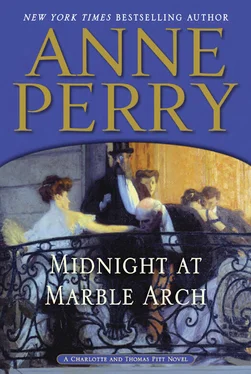Anne Perry - Midnight at Marble Arch
Здесь есть возможность читать онлайн «Anne Perry - Midnight at Marble Arch» весь текст электронной книги совершенно бесплатно (целиком полную версию без сокращений). В некоторых случаях можно слушать аудио, скачать через торрент в формате fb2 и присутствует краткое содержание. Жанр: Исторический детектив, на английском языке. Описание произведения, (предисловие) а так же отзывы посетителей доступны на портале библиотеки ЛибКат.
- Название:Midnight at Marble Arch
- Автор:
- Жанр:
- Год:неизвестен
- ISBN:нет данных
- Рейтинг книги:3 / 5. Голосов: 1
-
Избранное:Добавить в избранное
- Отзывы:
-
Ваша оценка:
- 60
- 1
- 2
- 3
- 4
- 5
Midnight at Marble Arch: краткое содержание, описание и аннотация
Предлагаем к чтению аннотацию, описание, краткое содержание или предисловие (зависит от того, что написал сам автор книги «Midnight at Marble Arch»). Если вы не нашли необходимую информацию о книге — напишите в комментариях, мы постараемся отыскать её.
Midnight at Marble Arch — читать онлайн бесплатно полную книгу (весь текст) целиком
Ниже представлен текст книги, разбитый по страницам. Система сохранения места последней прочитанной страницы, позволяет с удобством читать онлайн бесплатно книгу «Midnight at Marble Arch», без необходимости каждый раз заново искать на чём Вы остановились. Поставьте закладку, и сможете в любой момент перейти на страницу, на которой закончили чтение.
Интервал:
Закладка:
No one stirred.
Symington continued.
“He also manages to conveniently place a love letter of his own from his wife, to make it seem that the man who provided her with evidence of his revenge will be blamed for her rape. Thus in one terrible night he has destroyed the wife who would have exposed his revenge, and the man who provided her with the information. And he has done one more thing to protect himself. He has befriended the wife of the man he has framed, and promised to look after her when the unfortunate man is hanged. No doubt he has also said that he will see her destroyed if this man does not take the blame, silently and bravely, without speaking a word of the truth.
“Do I have your attention now, Mr. Hythe?”
Hythe was hanging on to the railing of the witness stand-but even so, his knees crumpled and he all but collapsed.
Symington turned to the jury. “Gentlemen, was ever greater evil planned and all but succeeded in fulfilling its dreadful purpose? But you know now what is going on. You can prevent it. You can find justice for Catherine Quixwood. You can save the life of the young man who tried to help her prevent ruin and exploitation. You can save the wife he loves so much he will die to protect her. Leave it to others to find and punish the rapist. Already action is taking place to bring that about.”
He turned a little with a gesture to include them all.
“The manipulators of money and investment will be punished. The wife who took a lover and was beaten for it is dead. Her husband has lost his fortune. We are almost at the end, gentlemen. Life and death, love and hate, greed and innocence are all in your hands. I beg you, act with the same mercy and forbearance we shall all need when we stand before the bar of judgment ourselves.”
Symington bowed to the jury and returned to his seat.
It was Bower’s turn to address the jury. He spoke little of fact, mostly of the brutality of the crime, repeating the worst details, his face twisted with rage and pity. He dismissed Symington’s theories as a magic trick, a wealth of nothing, designed to mislead them. There was no substance, he insisted, only a desperate and self-seeking lawyer’s castles in the air.
When the jury retired Vespasia was joined almost immediately by Narraway.
“Victor! What did you find?” she asked urgently.
“Catherine went to Bryanston Mews,” he answered. “She knew that Quixwood was Eleanor Forsbrook’s lover. A lot of what Symington said was guesswork, but it’s actually the only thing that makes sense.”
“Then it was Neville Forsbrook who raped Catherine?” she asked, still puzzled.
“I think it was Neville. Just as it was he who raped both Angeles Castelbranco and Alice Townley, and possibly others.”
“And the laudanum?” she persisted.
“Quixwood surely put it there, knowing she would drink it. If she didn’t he could always give it to her when he got home. It wouldn’t have been as safe for him, but it could still have worked.”
“What are we going to do about it?” she asked.
He smiled. “I hope we are going to get a verdict in Alban Hythe’s favor. Then we will consider proving Quixwood lied to protect Neville Forsbrook from being prosecuted for Angeles’s rape. I still want to see that young man pay for all he has done.” His voice caught.
The jury returned after two long hours, every minute of which dragged by at a leaden pace.
The courtroom was packed. There were even people standing in the aisle and at the back.
The proceedings were enacted at the majestic pace of the law. No one stirred. No one coughed.
The foreman of the jury answered in a calm, level voice.
“We find the prisoner, Alban Hythe, guilty as charged, my lord.”
In the dock Hythe bent forward, utterly beaten.
Maris Hythe looked as if she was about to faint.
Vespasia was stunned. She had truly hoped they had managed to cobble together enough information to create the required doubt, and the tide of despair that washed over her momentarily robbed her of thought. It was seconds, even a full minute before she could think of what to do next.
She took a long, slow breath and turned to Narraway. “This is not right,” she said quietly. “We have three weeks until he goes to the gallows. We must do something more.”
CHAPTER 20
Pitt refused to accept defeat. It was intolerable. Alban Hythe had neither raped nor killed Catherine Quixwood, and yet he had sat in court and watched the judge put on a black cap and sentence him to death. As always, three Sundays were allowed before the hanging, a period of grace-hardly much time in which to mount an appeal, even if they could find new evidence.
They needed more time. The only way to get that would be to have the Home Secretary grant a reprieve, and there were no grounds for it. Pitt had spent long hours at his office, wanting to be alone, at least away from those closest to him. Their pain distracted his mind, and he needed to be absolutely undivided in his concentration. He had no emotional strength to spare for comfort.
He paced back and forth across his office floor, shoulders hunched, muscles knotted. He went over it in his mind again and again, but there was nothing on which to appeal. Symington, crushed and miserable, had already said as much.
He was convinced that the answer they had found, and in part concocted out of fragments of evidence, was the truth. The unimaginative, pedestrian-minded jury had not believed them. Why not? What had they missed, done wrongly? Had it all rested on Bower’s stirring of rage and fear in them so passionate they could not think? Did they simply not believe that Catherine could have been as intelligent or brave as they had shown her to be? Did they need so intensely to punish someone that they could not wait for the right man?
Surely Symington had stirred their pity and their anger with Hythe’s willingness to sacrifice his own life to save Maris? But perhaps they were more taken in by Quixwood’s feigned grief.
He pulled himself up abruptly. The reason didn’t matter now. He needed to get Hythe a reprieve from the Home Secretary, a stay of execution long enough to find grounds for an appeal. They must not allow it to be over. Proof of Hythe’s innocence after he was dead was of no use at all-and also once the execution had taken place it would be twice as hard to convince anyone that the Court had made an irretrievable mistake, judicially murdered a totally innocent man.
What argument did he have to take to the Home Secretary? It was there in the shadows at the back of his mind, knowledge crowding the darkness. That was the power of his position.
He snatched his hat off the rack at the door, jammed it on his head, and left his office.
On the street he hailed a hansom and gave the driver the Home Secretary’s private address. He hated doing this, but there was no other way to save Alban Hythe’s life.
He sat in the cab rattling over the cobbles, oblivious of the traffic.
Much interesting and highly confidential information came his way. As head of Special Branch there were potentially dangerous secrets that he knew about many people in power. He had to guard their vulnerability to blackmail, or any other kind of inappropriate pressures. The Home Secretary was a decent man, if a little pompous at times. Pitt did not personally like him. Their backgrounds, experience and cultural values were different. There was no natural sympathy between them, as there had been between Pitt and many of the men he had worked for in the past. They had been well bred, in many cases ex-military or navy, like Narraway, but not politicians, not used to keeping the favor of others by always seeking the art of the possible coupled with the confidence of the majority.
Читать дальшеИнтервал:
Закладка:
Похожие книги на «Midnight at Marble Arch»
Представляем Вашему вниманию похожие книги на «Midnight at Marble Arch» списком для выбора. Мы отобрали схожую по названию и смыслу литературу в надежде предоставить читателям больше вариантов отыскать новые, интересные, ещё непрочитанные произведения.
Обсуждение, отзывы о книге «Midnight at Marble Arch» и просто собственные мнения читателей. Оставьте ваши комментарии, напишите, что Вы думаете о произведении, его смысле или главных героях. Укажите что конкретно понравилось, а что нет, и почему Вы так считаете.












